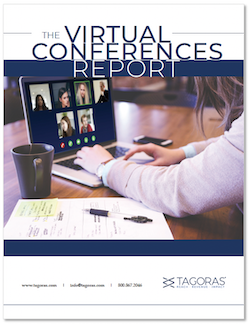
The Virtual Conferences Report

Most organizations that host conferences reach only a small slice of their potential audience with traditional place-based offerings. The remainder of the potential attendees get nothing—or worse yet, find other sources for learning and networking. Virtual conferences can help you solve this critical problem, and The Virtual Conferences Report gives you the information and insights you need to get started.
This comprehensive report is designed for decision-makers who want leading-edge knowledge to support their strategic planning for virtual events. It is equally valuable to vendors who serve or aim to serve the events and meetings industry.
The Virtual Conferences Report will help you:
- Determine timing and pricing for your virtual conferences
- Understand what level of registration and attendance to expect
- Identify the tools most commonly used to deliver virtual events
- Avoid the mistakes and benefit from the success of other organizations
The Virtual Conferences Report is available at no charge and on this special page requires no sign up. (This page may be shared by e-mail or within private online communities, but should not be shared publicly on the Web or social media.) Simply click the button below to download the report.
Additional Information
Based on survey data collected from 361 organizations, the 62-page report provides:
- An overview of the current state of virtual conferences
- Data for how virtual events are being used from three perspectives
- The operational perspective
- The business perspective
- The organizational perspective
- Perspectives on how COVID-19 has impacted virtual conferences
- Insights from authors Jeff Cobb and Celisa Steele, who together have nearly three decades of experience in helping organizations plan and implement learning and technology initiatives and who host an annual virtual conference themselves
What is a Virtual Conference?
To normalize responses, we offered this definition of virtual conference at the beginning of the survey on which The Virtual Conferences Report is based:
A virtual conference is a Web-based event that replicates many aspects of a traditional place-based conference, membership meeting, or trade show. It may take place on a standalone basis or in conjunction with a place-based conference (i.e., a “hybrid” event).
Virtual conferences feature multiple sessions (not just a single Webinar or Webcast) and may include keynote presentations, training and education workshops, discussion areas, social networking opportunities, exhibit areas for vendors, and various other features. Activities in a virtual conference may take place in real time (synchronously), on demand (asynchronously), or some combination of the two.
Brief Highlights
- Of the the 361 qualified responses, 21.6 percent indicate their organization has previously offered a virtual conference. Another 66.2 percent indicate they plan to offer a virtual conference in the coming 12 months
- 92.6 percent of those that plan to offer a virtual conference cite COVID-19, making it by far the biggest reason
- 59.8 percent of respondents have held a virtual conference have no formal, documented strategy for virtual conferences, and 19.5 percent say they aren’t sure whether they have a strategy
- 48.6 percent of respondents report their virtual conference lasted no more than a day and a half.
- Over three-quarters (79.7 percent) report that registrations for their virtual conference either met or exceeded expectations.
- 92.2% of those that have held a virtual conference say they will again
There simply is no better source for understanding the evolving role of virtual conferences in the events and educational event industry. If you are considering a virtual conference or other virtual event, you are on the verge of making a significant investment. The Virtual Conferences Report will help you learn fast and get on the road to success.
“Nearly 80 percent of organizations that have held a virtual conference found that registrations either met or exceeded expectations. Of organizations that have held a virtual event in the past, 92.2 percent indicated they would do so again—and many already have multiple times.”
from The Virtual Conferences Report
Related Resources
For resources related to The Virtual Conferences Report, visit our Leading Learning site.
